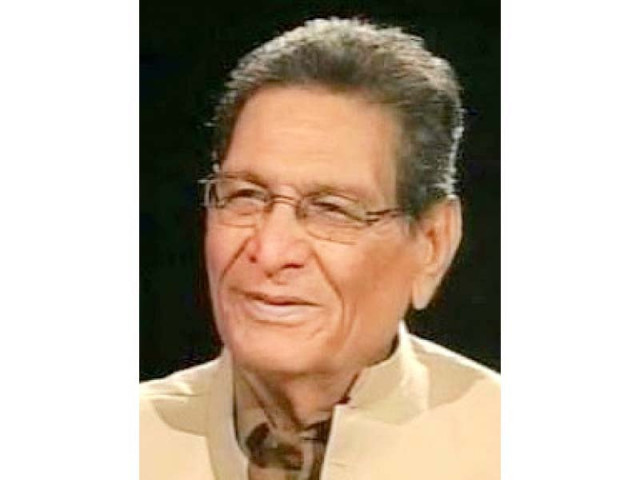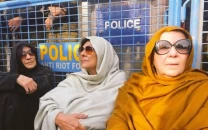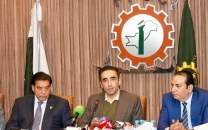Doyen of democracy passes away
Khan’s political career started post 1958 when Ayub Khan assumed power

Khan’s political career started post 1958 when Ayub Khan assumed power and Pakistan tilted towards regional alliances with the West. Student leaders opposed to this included Anwar Ahsan Siddiqui, Wahid Bashir and Agha Jaffer who advocated non-alignment and inspired Khan to join then left-leaning National Student Federation (NSF).
In 1959, he was imprisoned for three months at the Karachi jail, for the first time in his life for planning a protest during the visit of US President Eisenhower to Pakistan. This was followed by protests over the murder of Patrice Lumumba in Congo and the killings in riots in Jabalpur in which slogans against Ayub Khan were raised for the first time.
Khan was imprisoned for a year and was expelled from his college and the city. He, along with other expelled student leaders, received a warm welcome everywhere they went.
Undeterred by torture and imprisonment throughout his political struggle, Khan stood like a rock against dictators as well democrats who acted like dictators for decades in a never-ending battle based on principles.
Born in Nagpur on October 19, 1938, Mairaj Muhammad Khan was the youngest son of Hakeem Taj Muhammad Khan. His forefathers were Pathans hailing from the Tirah Valley of FATA who migrated to Qaimganj in Uttar Pradesh (UP).
Hakeem Taj Muhammad Khan used to practice Hikmat in different cities along with his family which was why Khan and his brothers Siraj Muhammad Khan, Wahaj Muhammad Khan (Dukhi Prem Nagri), journalist icon Minhaj Muhammad Khan (Barna) and sister Asghari Khanum (Sahar) were born in different cities.
Khan received his first four years of education from Jamia Millia Islamia in Delhi. In 1949, his family home was taken away as his father had moved to Quetta for the treatment of his sister.
The family went to Delhi where a family arranged passports and from where they flew to Lahore through Pak-Air. After a night’s stay, they travelled by train to Quetta.
In 1957, Khan ran away to Karachi because he did not want to marry according to his father’s wishes and gained admission at the Sindh Muslim College. Soon after, he was immersed in student politics.
Till 1965, Khan and Zulfikar Ali Bhutto, who was in Ayub’s cabinet, were at loggerheads. Bhutto supported the General against Fatima Jinnah in the 1965 presidential elections. Khan supported the Madar-e-Millat.
But when Bhutto left Ayub Khan following the Tashkent declaration fiasco, the two leaders got together. Bhutto himself came to Khan’s Tariq Road residence and offered him to join his struggle against Ayub Khan. This eventually led to the formation of the Pakistan Peoples Party with Bhutto, J A Rahim, Sheikh Rasheed, Hayat Muhammad Khan Sherpao, Rana Mukhtar, Rasool Bux Khan Talpur, Mubashir Hasan and others.
But the alliance did not last long even though Bhutto, in one press conference, declared Khan his political heir.
Not only were there disagreements over Bangladesh, Khan was also critical at Bhutto when he banned the National Awami Party and started military action against the Baloch. He resigned from the party over these issues as well as what he called the oppression against labourers and restrictions on the press.
But when Bhutto was caught up in the murder case, Khan forgot his personal suffering at the hands of his former leader and made a plan to paralyse the whole country just a week before his hanging but the government did not let their plan materialise. Khan was also against the division of Karachi’s people on ethnic basis and had rejected Zia’s offer to make a Mohajir party in Karachi as he knew that the division would result in bloodshed in the city, which was serving a base for pro-democratic forces and the military dictator was considering Karachi a threat.
He was of the view that poor people cannot run a political party in this country. He experienced this himself with the Qaumi Mahaz-e-Azadi, which played an important role in the Movement for the Restoration of Democracy but could not survive. The party had no office as he could not ask anybody for donations.
He also regretted his decision of joining the Pakistan Tehreek-e-Insaf in 2000 which he left in 2003. “In those days I was free and I believe it was a decision taken in haste,” he had said. Earlier, he enjoyed a short stint with the Muttahida Qaumi Movement as well. Khan was an advocate of industrial and scientific advancement in the country for which he considered a strong education system as imperative.
In the last days of his life when his health did not permit him to participate in political activities, he would spend most of his time with his grandchildren and plants including a thorny cactus, which he imported from France when it was a small bud and had now become a full grown plant.
He is survived by his son Khaqan Muhammad Khan, daughter Tania and his wife.
Published in The Express Tribune, July 23rd, 2016.



















COMMENTS
Comments are moderated and generally will be posted if they are on-topic and not abusive.
For more information, please see our Comments FAQ